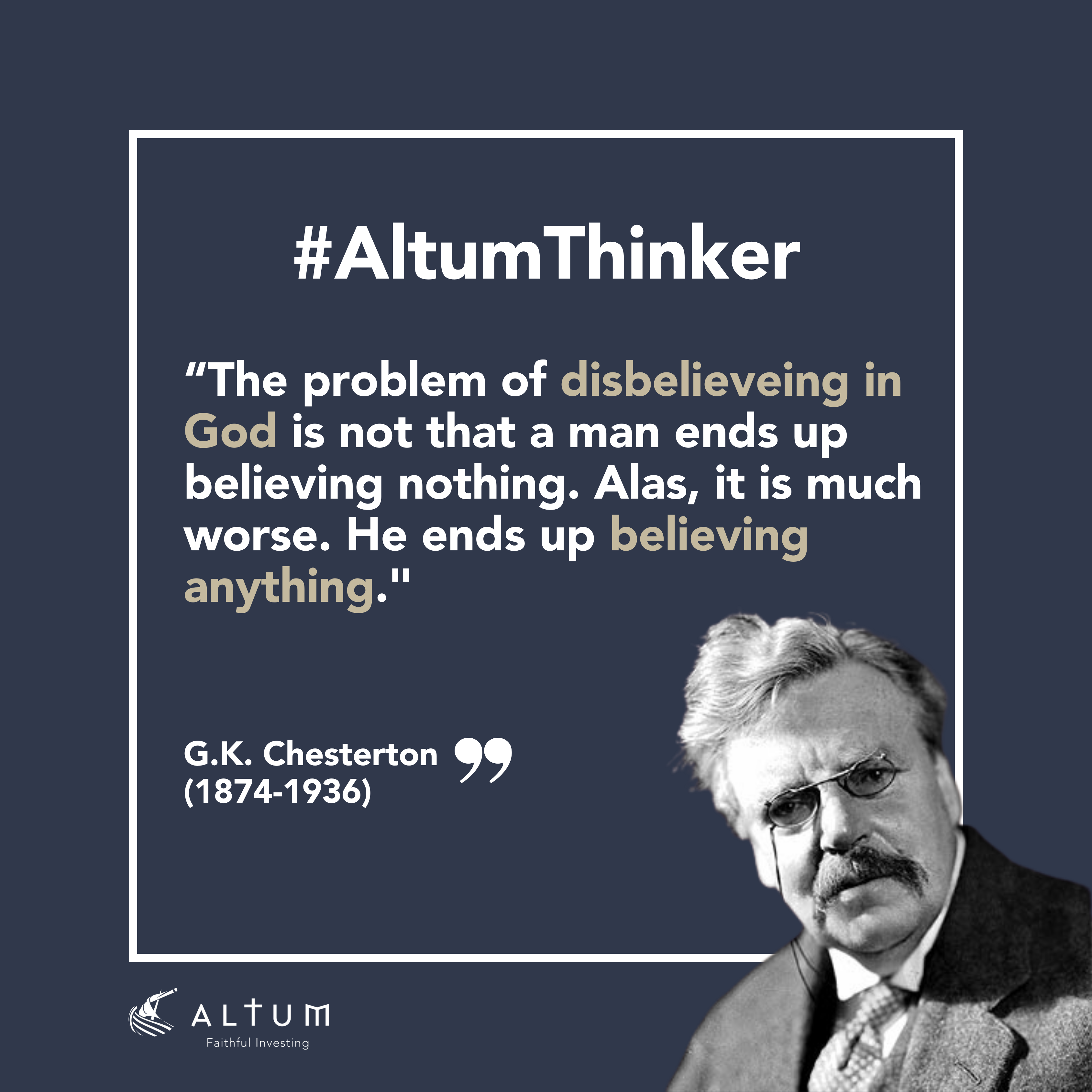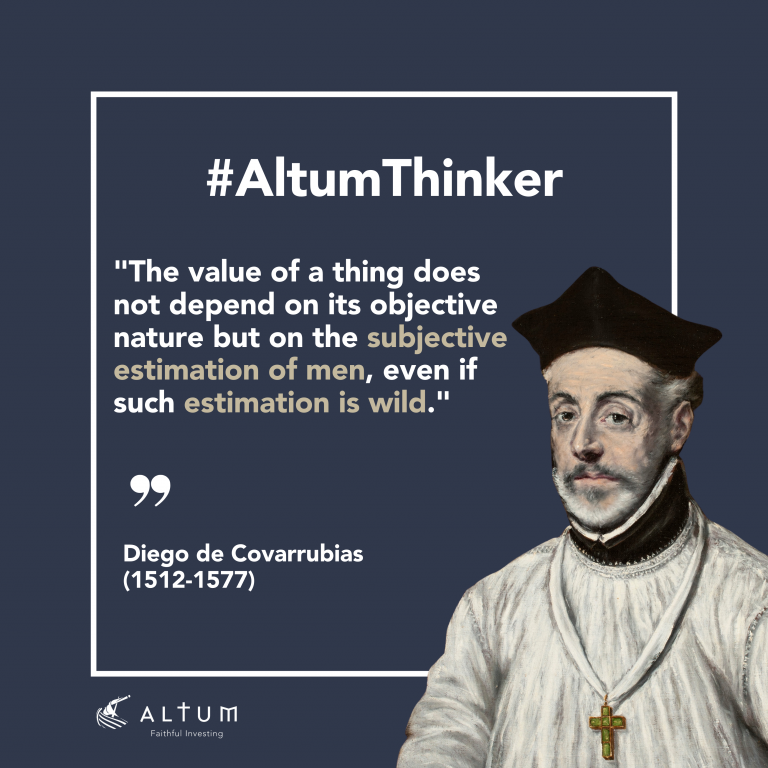He was a journalist, a controversial figure, a realist, a lover of debate, and a convert. All thanks to a spiritual journey he depicted like no other, one destined for no other terminus but the return to the embrace of Christ. Who better to craft an economic theory? One completely aligned with human nature.
Together with Hilaire Belloc, Gilbert K. Chesterton formulated the theory of Distributism and is now considered one of the most influential thinkers in Christian and modern thought. While he is perhaps best known for his prolific contributions to literature, Chesterton’s intellectual accomplishments extended into the realm of economics. His economic theory, Distributism, emphasized the importance of widespread property ownership and sought to address the social and economic inequalities of his time, based on the God-oriented nature of men rather than on just materialistic considerations. Chesterton’s perspective continues to inspire contemporary thinkers as we keep on exploring alternative economic models.
His formulation of Distributism is born as a response to the Church’s social doctrine, offering an alternative to capitalism and socialism. It is based on an authentic social anthropology, in which the aim is to give back to the person all the centrality that should correspond to them in any process of political and economic organization of society, processes in which only the person can be taken as an end in himself, and never as a means[1]. In this sense, it is a theory formulated on the basis of the philosophical foundation of the Catholic Social Teaching. In fact, this theory is inspired by the principles laid down in the encyclical Rerum Novarum and the contribution of Leo XIII which sought a just and harmonious balance between capital and labor to protect the rights and dignity of workers.
The main tenet of Distributism is that the only way to build a just world is to distribute property so that it is not concentrated in very few hands, condemning ever larger masses of people to a life of misery[2]. In his own words: “Property is merely the art of democracy. It means that every man should have something that he can shape in his own image, as he is shaped in the image of heaven”[3]. Chesterton and the distributists also promoted the idea that property should be primarily small-scale and rooted in local communities. They encouraged family farming, family businesses and local cooperatives as forms of economic organization. The belief was that this would contribute to a more decentralized economy and greater community solidarity.
Chesterton’s Distributism often faced criticism for its perceived lack of practical application. Some argue that distributism may be overly idealistic and that implementing it on a large scale could lead to economic inefficiencies or hinder economic growth. Critics also point out that Chesterton’s distributism sometimes overlooks the challenges of transitioning from existing economic systems to a distributist model.
These criticisms may indeed hold merit within specific contexts. However, what distributism proposes is not a change of system, but a spiritual transformation. It does not constitute a ‘third way,’ as it is often labeled. Every economic theory and practice implicitly rest upon some underlying anthropological view. Chesterton and Belloc’s proposition seeks precisely to alter such foundation. While both capitalism and socialism are rooted in a materialistic and utilitarian worldview, distributism finds its basis in Christian anthropology, as interpreted in the practical directives of the encyclicals that serve as its inspiration. Consequently, the change is much deeper than just that of a system. From this perspective, the critique of a systemic shift is tempered by the fact that what is proposed is a full-scale conversion. It entails a transformation of motivations and priorities rather than an overhaul of the system.
Lastly, Chesterton firmly supported the principle of subsidiarity, one of the most important principles of the Catholic Social Teaching regarding economics, which asserted that matters should be handled at the local or community level whenever possible. The principle of subsidiarity is aligned with the distributist vision of economic and political decentralization. Chesterton saw subsidiarity as a way to empower local communities and enable them to make decisions that best suited their specific needs, rather than being dictated by a distant authority. In the same sense, a distributist system grants genuine freedom upon families, which is why it poses a threat to established powers. It is a system in which every household possesses the essential means for its subsistence, free from reliance on either public administrations or vast corporate conglomerates or financial authorities. In doing so, it undermines some of the most time-honored tools of mass subjugation. This is the reason Chesterton contends that “the word rebel understates our cause”[4].
In summary, G. K. Chesterton was an advocate of distributism, an economic and social theory that advocated for a more equitable distribution of property, the promotion of local small businesses, and economic decentralization. His ideas revolved around the significance of private ownership, subsidiarity, and criticism of both capitalism and socialism. While distributism has not become a dominant economic system, it has exerted influence on the social and economic thought of certain groups and thinkers over time.
[1] Sada, Daniel, Gilbert Keith Chesterton y el Distributismo Inglés en el Primer Tercio del Siglo XX, 2005, Fundación Universitaria Española. Available at: http://ddfv.ufv.es/bitstream/handle/10641/1304/chesterton-COMPLETO-02.pdf?sequence=5&isAllowed=y
[2] de Prada, Juan Manuel, Juan Manuel de Prada: “Chesterton disuelve las ideologías modernas”, 2019, Alfa y Omega. Available at: https://alfayomega.es/chesterton-disuelve-las-ideologias-modernas/
[3] Chesterton, G.K., What’s Wrong with the World, 1910.
[4] Chesterton, G.K., Utopia of Usurers, 2000. Available at: https://www.gutenberg.org/files/2134/2134-h/2134-h.htm




